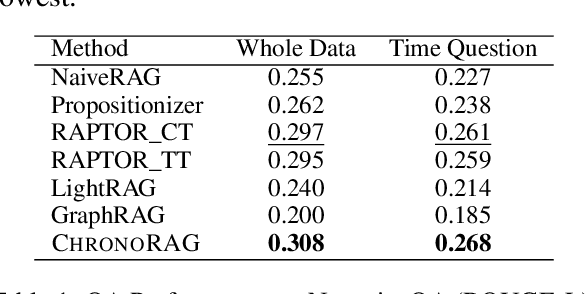Joonho Yang
Chronological Passage Assembling in RAG framework for Temporal Question Answering
Aug 26, 2025



Abstract:Long-context question answering over narrative tasks is challenging because correct answers often hinge on reconstructing a coherent timeline of events while preserving contextual flow in a limited context window. Retrieval-augmented generation (RAG) indexing methods aim to address this challenge by selectively retrieving only necessary document segments. However, narrative texts possess unique characteristics that limit the effectiveness of these existing approaches. Specifically, understanding narrative texts requires more than isolated segments, as the broader context and sequential relationships between segments are crucial for comprehension. To address these limitations, we propose ChronoRAG, a novel RAG framework specialized for narrative texts. This approach focuses on two essential aspects: refining dispersed document information into coherent and structured passages, and preserving narrative flow by explicitly capturing and maintaining the temporal order among retrieved passages. We empirically demonstrate the effectiveness of ChronoRAG through experiments on the NarrativeQA dataset, showing substantial improvements in tasks requiring both factual identification and comprehension of complex sequential relationships, underscoring that reasoning over temporal order is crucial in resolving narrative QA.
Hallucinate at the Last in Long Response Generation: A Case Study on Long Document Summarization
May 21, 2025Abstract:Large Language Models (LLMs) have significantly advanced text generation capabilities, including tasks like summarization, often producing coherent and fluent outputs. However, faithfulness to source material remains a significant challenge due to the generation of hallucinations. While extensive research focuses on detecting and reducing these inaccuracies, less attention has been paid to the positional distribution of hallucination within generated text, particularly in long outputs. In this work, we investigate where hallucinations occur in LLM-based long response generation, using long document summarization as a key case study. Focusing on the challenging setting of long context-aware long response generation, we find a consistent and concerning phenomenon: hallucinations tend to concentrate disproportionately in the latter parts of the generated long response. To understand this bias, we explore potential contributing factors related to the dynamics of attention and decoding over long sequences. Furthermore, we investigate methods to mitigate this positional hallucination, aiming to improve faithfulness specifically in the concluding segments of long outputs.
Crafting the Path: Robust Query Rewriting for Information Retrieval
Jul 17, 2024Abstract:Query rewriting aims to generate a new query that can complement the original query to improve the information retrieval system. Recent studies on query rewriting, such as query2doc (Q2D), query2expand (Q2E) and querey2cot (Q2C), rely on the internal knowledge of Large Language Models (LLMs) to generate a relevant passage to add information to the query. Nevertheless, the efficacy of these methodologies may markedly decline in instances where the requisite knowledge is not encapsulated within the model's intrinsic parameters. In this paper, we propose a novel structured query rewriting method called Crafting the Path tailored for retrieval systems. Crafting the Path involves a three-step process that crafts query-related information necessary for finding the passages to be searched in each step. Specifically, the Crafting the Path begins with Query Concept Comprehension, proceeds to Query Type Identification, and finally conducts Expected Answer Extraction. Experimental results show that our method outperforms previous rewriting methods, especially in less familiar domains for LLMs. We demonstrate that our method is less dependent on the internal parameter knowledge of the model and generates queries with fewer factual inaccuracies. Furthermore, we observe that Crafting the Path has less latency compared to the baselines.
FIZZ: Factual Inconsistency Detection by Zoom-in Summary and Zoom-out Document
Apr 18, 2024Abstract:Through the advent of pre-trained language models, there have been notable advancements in abstractive summarization systems. Simultaneously, a considerable number of novel methods for evaluating factual consistency in abstractive summarization systems has been developed. But these evaluation approaches incorporate substantial limitations, especially on refinement and interpretability. In this work, we propose highly effective and interpretable factual inconsistency detection method metric Factual Inconsistency Detection by Zoom-in Summary and Zoom-out Document for abstractive summarization systems that is based on fine-grained atomic facts decomposition. Moreover, we align atomic facts decomposed from the summary with the source document through adaptive granularity expansion. These atomic facts represent a more fine-grained unit of information, facilitating detailed understanding and interpretability of the summary's factual inconsistency. Experimental results demonstrate that our proposed factual consistency checking system significantly outperforms existing systems.
 Add to Chrome
Add to Chrome Add to Firefox
Add to Firefox Add to Edge
Add to Edge